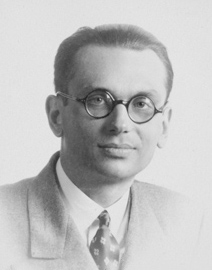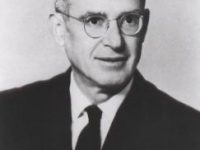
Kurt Gödel (1906-1978)
On April 28, 1906, Kurt Gödel was born. He was one of the most significant logicians of all time. Gödel made an immense impact upon scientific and philosophical thinking in the 20th century, a time when many, such as Bertrand Russell, A. N. Whitehead and David Hilbert were pioneering the use of logic and set theory to understand the foundations of mathematics.
“Either mathematics is too big for the human mind, or the human mind is more than a machine.”
— Kurt Gödel as quoted in Topoi : The Categorial Analysis of Logic (1979) by Robert Goldblatt, p. 13
Youth and Education
Kurt Gödel came from a wealthy upper middle-class family in Brno, Moravia. His parents were Marianne (née Handschuh) and Rudolf August Gödel from Brno. The father was a wealthy textile entrepreneur. Caused by rheumatic fever, Gödel often suffered from poor health in his childhood. However, he did his best at school. After the First World War Brno became part of the newly founded Czechoslovak Republic in 1918/1919 and in 1923 Gödel, who felt like an “Austrian exile in Czechoslovakia” took Austrian citizenship. In autumn 1924, after graduating from high school, Gödel moved to Vienna and enrolled at the University of Vienna, initially in the course of studies in theoretical physics. He also attended Heinrich Gomperz’s philosophical lecture and Philipp Furtwängler’s lecture on number theory. These two professors gave Gödel the decisive impetus to work intensively on the fundamentals of mathematics, which are based on formal logic and set theory. Furtwängler was an outstanding mathematician and teacher, but in addition he was paralysed from the neck down so lectured from a wheel chair with an assistant who wrote on the board. This would make a big impact on any student, but on Gödel who was very conscious of his own health, it had a major influence. [5]
Hilbert’s Program
He began to visit the Wiener Kreis (Vienna Circle), an academic circle founded by Moritz Schlick, which dealt with the methodological foundations of thinking and thus with the foundations of any philosophy. Conversations with the other members of the group, of which Hans Hahn, Karl Menger and Olga Taussky were of particular importance to Gödel, also led to the expansion of his mathematical knowledge. Fascinated by the conversations in the Vienna Circle, Gödel attended Karl Menger‘s Mathematische Kolloquium and became familiar with the fundamental problems of mathematics and logic of his time. In particular, he got to know Hilbert’s program, which was to prove the consistency of mathematics.[2] He was awarded his doctorate on 6 February 1930 for his dissertation entitled Über die Vollständigkeit des Logikkalküls (1929) under the supervision of Hans Hahn.
Über formal unentscheidbare Sätze der Principia Mathematica und verwandter Systeme
He became a member of the faculty of the University of Vienna in 1930, where he belonged to the school of logical positivism until 1938. Gödel is best known for his two incompleteness theorems, published in 1931 when he was 25 years old in Über formal unentscheidbare Sätze der Principia Mathematica und verwandter Systeme. He proved fundamental results about axiomatic systems, showing in any axiomatic mathematical system there are propositions that cannot be proved or disproved within the axioms of the system. In particular the consistency of the axioms cannot be proved. This ended a hundred years of attempts to establish axioms which would put the whole of mathematics on an axiomatic basis. One major attempt had been by Bertrand Russell with Principia Mathematica (1910-13).[3] Another was Hilbert’s formalism which was dealt a severe blow by Gödel’s results. The theorem did not destroy the fundamental idea of formalism, but it did demonstrate that any system would have to be more comprehensive than that envisaged by Hilbert. Gödel’s results were a landmark in 20th-century mathematics, showing that mathematics is not a finished object, as had been believed. It also implies that a computer can never be programmed to answer all mathematical questions.[2]
“But every error is due to extraneous factors (such as emotion and education); reason itself does not err.”
Attributed as a remark of Gödel of 29th November 1972, in Incompleteness (2005) by Rebecca Goldstein
Academic Career
Submitting his paper on incompleteness to the University of Vienna for his habilitation, this was accepted by Hahn on 1 December 1932. Gödel became a Privatdozent at the University of Vienna in March 1933. Gödel’s groundbreaking work on completeness and the logic of provability earned him recognition as one of the leading logicians of his time. His American colleague Oswald Veblen invited him to Princeton to join the newly founded Institute for Advanced Study.[6] In 1933/1934 he travelled to America for the first time. Together with James Alexander, John von Neumann and Oswald Veblen he became a founding member of the faculty and gave a number of lectures.[7] When Gödel returned to the now dictatorial Vienna in the spring of 1934, he had already received the invitation to continue as a lecturer. Gödel was not interested in the political situation in Europe.
A Fragile Health
Travel and work exhausted Gödel. Now the mental illness, which he probably had latent in him since childhood, became noticeable as depression. In autumn 1934 he had to go to a sanatorium for a week. In 1935 he spent several months in a psychiatric clinic. When the philosopher Moritz Schlick, one of the leading heads of the Vienna circle, was murdered by a former student at Vienna University in June 1936, Gödel suffered a nervous breakdown. He developed hypochondriac obsessions, especially a pathological fear of being poisoned. Since Gödel did not eat enough, his physical health suffered increasingly. His condition deteriorated over the years. Since he fell ill with rheumatic fever as a child, he was convinced that he had a weak heart and developed distrust of the medical profession, which could find nothing like this in him. He avoided doctors and almost died of an untreated duodenal ulcer in the 1940s.
Emigration to the U.S.
When the war started Gödel feared that he might be conscripted into the German army. Of course he was also convinced that he was in far too poor health to serve in the army, but if he could be mistaken for a Jew he might be mistaken for a healthy man. He was not prepared to risk this, and after lengthy negotiation to obtain a U.S. visa he was fortunate to be able to return to the United States, although he had to travel via Russia and Japan to do so.[2] Gödel was now more concerned with philosophy, especially with Gottfried Wilhelm Leibniz, later also with Edmund Husserl. In Princeton he began to deal more and more with philosophical problems and to turn away from formal logic.[8,9]
Friendship with Einstein
In 1942 Gödel got to know Albert Einstein better and began to discuss physical problems such as relativity and philosophical topics with him.[10] A close friendship developed between Einstein and Gödel, which lasted until Einstein’s death in 1955. Together they used to walk to the institute and home. Einstein once said that he would only come to the Institute “to have the privilege of walking home with Gödel“. In 1947 Gödel became a citizen of the USA. The naturalisation process required a judicial hearing in which he had to show knowledge of the country and the constitution. In his preparations for this, Gödel discovered that the country’s constitution was incomplete to the extent that it would have been possible to establish a dictatorship within the framework of this constitution despite its individual provisions protecting democracy. Two friends, Albert Einstein and the economist Oskar Morgenstern, accompanied him during the proceedings. Thanks to their help and an enlightened judge it was possible to prevent Gödel from getting himself into trouble at the hearing.[11]
Professor in Princeton
It was not until 1953 that he was appointed professor at Princeton, as Hermann Weyl and Carl Ludwig Siegel in particular considered him unsuitable because of his strange behaviour.[12] In 1955 he was elected to the National Academy of Sciences, in 1957 to the American Academy of Arts and Sciences. He stopped giving lectures in the 1960s. His illness made him less and less able to work and participate in social life. Nevertheless, he was still considered one of the leading logicians, and he was granted academic recognition in the form of awards. Gödel’s condition did not improve. In 1970 he tried to publish for the last time. However, the scripture had to be withdrawn because he had overlooked many errors due to the effect of psychotropic drugs.
Last Years
Gödel spent the last years of his life at home in Princeton or in various sanatoria, from which he fled several times. Only the care of his wife Adele, who made sure that he ate at least halfway normally, kept him alive. When Adele Gödel was admitted to hospital in 1977 due to a stroke, she was helplessly forced to watch her husband lose weight. When she was released after six months – now dependent on a wheelchair – she immediately delivered him to a hospital with a body weight of about 30 kg. Kurt Gödel died a few weeks later of malnutrition and exhaustion.
The paradox at the heart of mathematics: Gödel’s Incompleteness Theorem – Marcus du Sautoy, [15]
- [1] It’s Computable – thanks to Alonzo Church, SciHi Blog
- [2] David Hilbert’s 23 Problems, SciHi Blog
- [3] The time you enjoy wasting is not wasted time – Bertrand Russell, Logician and Pacifist, SciHi Blog
- [4] Kurt Gödel at zbMATH
- [5] O’Connor, John J.; Robertson, Edmund F., “Kurt Gödel“, MacTutor History of Mathematics archive, University of St Andrews.
- [6] Oswald Veblen and modern Topology, SciHi Blog
- [7] John von Neumann – Game Theory and the Digital Computer, SciHi Blog
- [8] Let Us Calculate – the Last Universal Academic Gottfried Wilhelm Leibniz, SciHi Blog
- [9] Edmund Husserl’s Phenomenology, SciHi Blog
- [10] Albert Einstein revolutionized Physics, SciHi Blog
- [11] Oskar Morgenstern and the Game Theory, SciHi Blog
- [12] Hermann Weyl – between Pure Mathematics and Theoretical Physics, SciHi Blog
- [13] Kurt Gödel at Mathematics Genealogy Project
- [14] Kurt Gödel at Wikidata
- [15] The paradox at the heart of mathematics: Gödel’s Incompleteness Theorem – Marcus du Sautoy, TED-Ed @ youtube
- [16] Timeline for Kurt Gödel, via Wikidata





